Governance Initiatives
Corporate Governance
Basic approach to corporate governance
We regard the enhancement of corporate governance as an important management issue. We have positioned the timely implementation of necessary measures and fulfillment of accountability as the basis of our efforts, with the aim of realizing fair and highly transparent management that can respond quickly to changes. In order for our group to achieve sustainable growth, we are strongly aware of the need to strengthen our efforts in non-financial aspects, represented by ESG (Environmental, Social and Governance), rather than pursuing only financial growth in terms of sales and profits. We will position the resolution of social issues such as the SDGs as the foundation of our management. We will share our management vision with our shareholders and all other stakeholders by listening to what they expect from the Group. Furthermore, we will continuously review the state of our corporate governance and implement necessary measures and improvements as appropriate.
Corporate governance structure
- Overview of the corporate governance structure
- The Board of Directors is the highest decision-making body for business execution.The Board of Directors meets monthly to decide management policies, to review legal and other important issues, and to supervise the performance of directors' duties. As of May 23, 2025, the Board of Directors consists of 11 members: Toshiya Takeuchi, President and Representative Director and Chair; Akio Takeuchi, Takahiko Watanabe, Clay Eubanks, Osamu Kobayashi, Hiroshi Yokoyama, and Minoru Kusama, all of whom are directors; and Michio Iwabuchi, Yuko Miyata, Eiko Ori, and Kunitake Ando, who are outside directors.
- The Board of Directors appoints executive directors and executive officers who are responsible for business execution. If necessary, executive officers are invited to Board meetings to ensure that management decisions are communicated reliably and that business execution is carried out promptly.
- The Board of Directors formulates a medium-term business plan and an annual plan, and each department formulates its business plan based on these plans. The Board of Directors also receives regular reports on the progress of the annual plan from the executive directors.
- The Audit and Supervisory Committee consists of four outside directors and one internal director. In principle, the Committee meets once a month. In addition, the committee members attend important meetings, such as Board of Directors meetings, and audit the performance of directors' duties as well as the operation of internal control systems.As of May 23, 2025, the Audit & Supervisory Committee consists of five members: Minoru Kusama, a full-time Director and Audit & Supervisory Committee member, serving as Chair, and four outside Directors, Michio Iwabuchi, Yuko Miyata, Eiko Ori, and Kunitake Ando.
- The Nomination Advisory Committee and the Remuneration Advisory Committee are both voluntary advisory bodies to the Board of Directors. These committees deliberate on the nomination, dismissal, remuneration, etc. of directors based on an inquiry from the Board of Directors and submit their recommendations to the Board of Directors. The Board of Directors considers the advisory committees' recommendations when making decisions. As of May 23, 2025, the Nomination Advisory Committee and Remuneration Advisory Committee are chaired by Michio Iwabuchi, an outside director, and consist of three outside directors, Yuko Miyata, Eiko Ori, and Kunitake Ando, as well as Toshiya Takeuchi, President and Representative Director, and Minoru Kusama, Director.
- The Sustainability Promotion Committee is chaired by the President and Representative Director of the Company, and its members include directors and executive officers of the Company, chief operating officers of subsidiaries, and other members deemed appropriate based on the duties of their responsibilities.
-
The following is an outline of our corporate governance structure.
Corporate Governance Structure
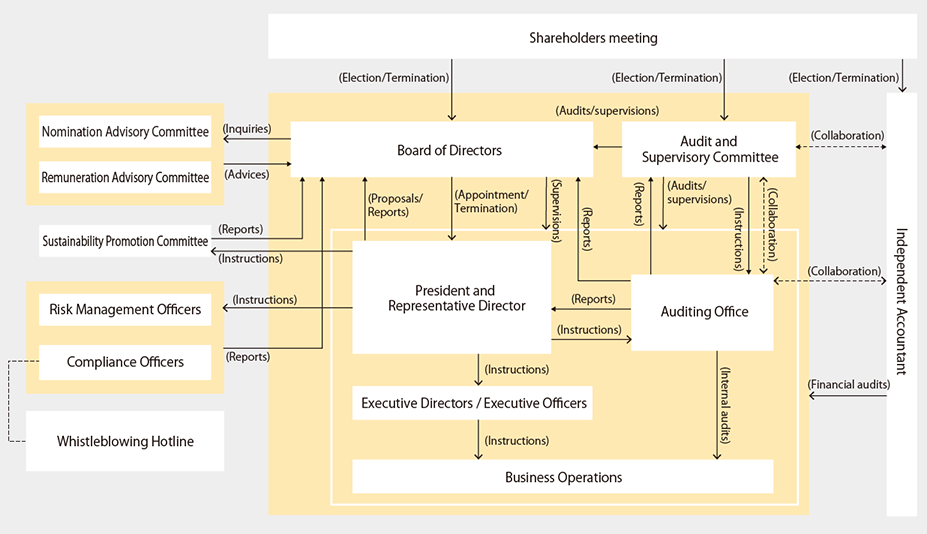
-
Other matters related to corporate governance
[Status of internal control systems]
To ensure that the execution of duties by directors and employees conforms to all laws and regulations as well as the Articles of Incorporation, and that the Company's social responsibilities are being fulfilled, we established our Corporate Philosophy, Code of Conduct, Compliance Regulations, and Compliance Manual, and we have appointed compliance officers to inform directors and employees of the compliance policy.[Status of risk management system]
For risk management, we have established the Risk Management Regulations, have appointed risk management officers, and we maintain a system for recognizing and managing risks.[System for ensuring the effectiveness of operations in Group management]
For the Group's overall management, to ensure the effectiveness of operations at subsidiaries, we make certain that the directors and employees of subsidiaries are carefully informed of the Corporate Philosophy and Code of Conduct established by Takeuchi Mfg. In addition, we established the Group Supervision Rules as well as a system where the home office approves important aspects of the execution of the duties by subsidiaries’ directors, and we periodically receive reports on the status of their execution of duties.
Status of internal audits and audits by the Audit and Supervisory Committee
The Audit Office, reporting directly to the president, is independent from business departments. In this office, two full-time employees audit the business operations and the risk management of the business departments of the home office and all subsidiaries, then instructs them on any necessary improvements. The Audit Office exchanges information with the Audit Committee and the accounting auditor regarding the status of internal audits and accounting audits, and works closely with them. They also compiles the findings and suggestions for improvement from internal audits into a report, which is presented to the President and Representative Director and the Board of Directors.
Audits by the Audit and Supervisory Committee are conducted by the five Audit & Supervisory Committee Members based on an annual audit plan. When conducting audits. The committee regularly exchanges information with the accounting auditors and works with the internal auditing department by receiving reports from them.
Status of accounting audits
For accounting audits, we have concluded an audit agreement with Deloitte Touche Tohmatsu LLC and are audited based on this agreement.
Risk management
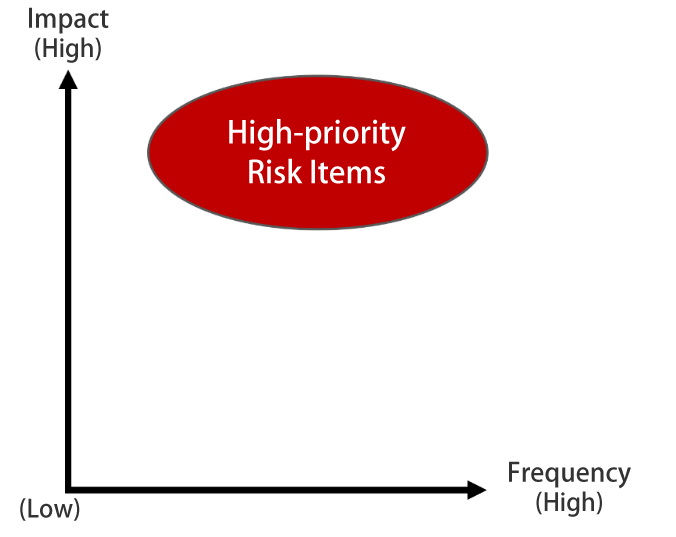
We have established "Risk Management Rules" regarding the development of a management system to prevent the occurrence of risks that may arise in our business activities, and to respond to risks that materialize. Company-wide risks such as changes in the business environment, climate change, natural disasters, incidents/accidents, and information system failures are managed collectively by the Sustainability Promotion Committee, as they have a significant impact on the sustainability of the Group's business.
Specifically, risk items that have a high impact on the Group and a high frequency of occurrence are visualized on a risk map, the results of which are reported to the Board of Directors, and countermeasures are considered and implemented for each high-priority risk item.
Risk Map Creation
Our risk items extracted by area
| Risk Areas | Risk Items |
|---|---|
| Hazard Risk | Natural disasters, industrial accidents, fire, accidents |
| Operational Risk |
Operational Risk Business risks ( R&D, Procurement, Manufacturing, Sales, Quality, Information System) ESG risks ( Environmental, Social, and Governance) |
| Strategic Risk | Management strategy, human resources strategy, development strategy, sales strategy, real estate strategy |
| Economic risk | Foreign exchange fluctuation, economic fluctuation, interest rate fluctuation, geopolitical risk |
- Based on the above risk items, a risk survey (using an external consulting company) was conducted on our full-time directors, executive officers, and all general managers, and a quantitative and qualitative assessment was made.
- Based on the results of the risk survey, a risk map was created based on the impact and frequency of each risk item, and high-priority risks that should be addressed were identified.
Risks that could influence investors' decisions
Shown below are issues related to Takeuchi Group's business operations and accounting that could have an important influence on investors' decisions.
Forward-looking statements are based on the Group's judgement as of the date of submission of the annual securities report(May 23, 2025).
1. Exchange rate fluctuations
2. Fluctuations in raw material prices, freight cost, and tariff rates
3. Procurement
4. Natural disasters, etc.
5. Economic and market conditions
6. Competition
7. Credit management
8. Securing human resources
9. Environmental regulations, climate-related regulations, and other official regulations, etc.
10. Geographical concentration of production sites
11. Product quality
12. Information security
13. Intellectual property rights
Business continuity plan (BCP)
We have written the BCP Manual (administered by the General Affairs Department) that has prepared us to maintain business continuity.
Procedure after BCP activation
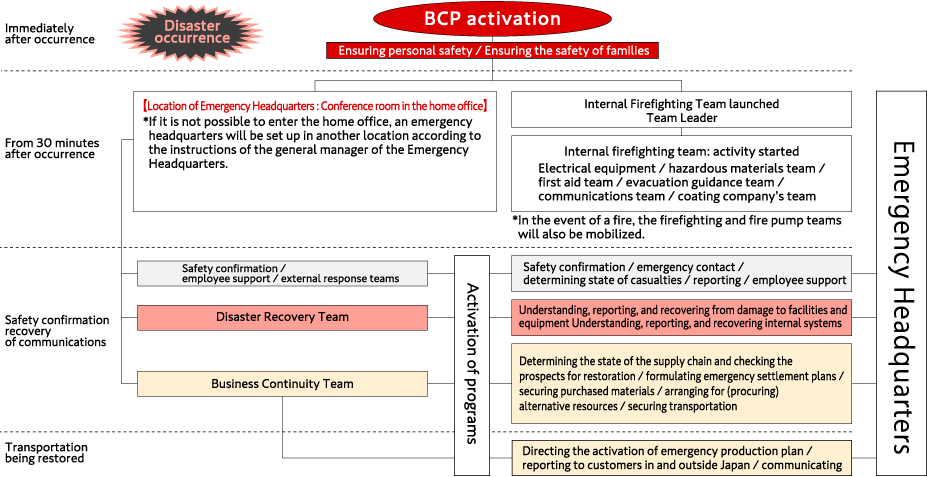
Disaster recovery scenarios
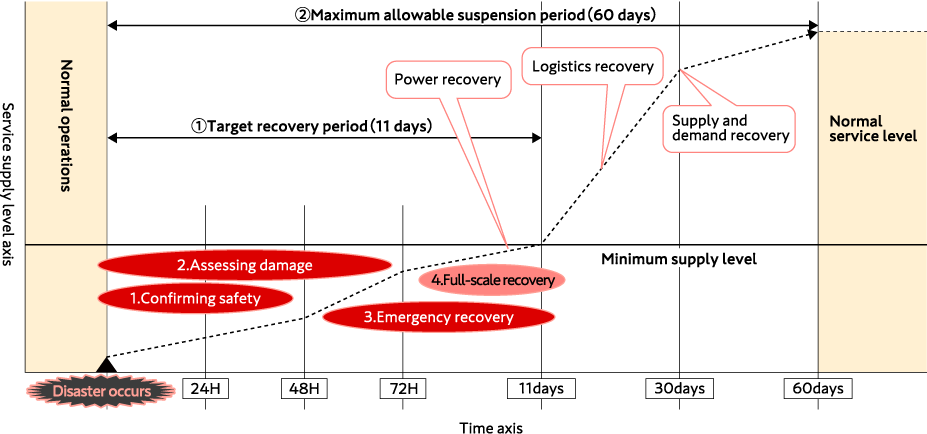
Information security
We believe that it is our social responsibility to protect information assets, and we are consistently working to strengthen information security, focusing on the following:
- Prohibiting anyone from storing or removing any internal documents outside the company
- Preventing data loss and falsification
- Prohibiting all unauthorized access
- IT security policy (Approved at the Board of Directors meeting on August 30, 2023)
Stakeholder engagement
Through dialogues and joint initiatives with stakeholders, we demonstrate the importance of stakeholder engagement. In this way, we grasp stakeholders' opinions, requests, and concerns, then apply that information to improve business management.
Our main stakeholders are the customers we provide products and services to; suppliers who support our production; shareholders and investors who are directly affected by the results of our business activities; employees working in the Takeuchi Group; and local communities. In addition, there are administrative bodies for compliance, such as local governments and supervisory ministries, and industry-academia-government collaboration and industry groups for information gathering and sharing necessary for business activities. Furthermore, we believe that the younger generation—children and students—are important stakeholders because they have the potential to become members of the Takeuchi Group in the future as well as being "treasures of society."
Main opportunities and points of contact for dialogue with stakeholders
| Stakeholders | Main opportunities for dialogue and joint activities | Main points of contact for dialogue |
|---|---|---|
| Customers |
|
|
| Suppliers |
|
|
| Shareholders and investors |
|
|
| Employees |
|
|
| Local Community |
|
|
| Local governments and supervising ministries |
|
|
| Industry- Academia -Government Cooperation |
|
|
| Next generation (children, students, etc.) |
|
|
| Industry Associations |
|
|
*All stakeholders are important, and we do not prioritize one stakeholder group over another.
Organization Memberships (Domestic)
| Classification | Organization name |
|---|---|
| Business Organizations | Nagano Employers' Association |
| Nagano Economic Research Institute | |
| Sakaki-machi Commerce and Industry Association | |
| Togura Kamiyamada Commerce and Industry Association | |
| The Tokyo Chamber of Commerce and Industry | |
| Industry Associations | Safety Association of Construction and Loading Vehicles |
| Japan Machinery Center for Trade and Investment | |
| Japan Construction Equipment Manufacturers Association | |
| Japan Construction Machinery and Construction Association | |
| Industry-Academia-Government Cooperation | Sakaki Industry-Academia-Government Cooperation Institute |
| Educational Research and Development Association of Nagano Prefectural Institute of Technology | |
| Technology Promotion Association of National Institute of Technology, Nagano College | |
| Technology Exchange | Nagano Institute of Invention and Innovation |
| Sakaki Technology Exchange Institute | |
| Japanese Standards Association | |
| The Institution of Professional Engineers, Japan | |
| Other Organizations | Sakaki-machi Council for the Promotion of Human Rights and Social Integration Education of Companies |
| Sakaki-machi International Exchange Association | |
| Sakaki-machi Council for the Promotion of International Industrial Research | |
| Koshoku Labor Standards Association | |
| Koshoku Employment Security Association | |
| Minaminagano Koshoku Welding Engineering Society | |
| Koshoku-Area Cooperative Society | |
| Nagano Industrial Relations Research Association | |
| Nagano Prefecture Driving Safety Manager Association (Chikuma branch) | |
| Nagano Association for Conserving Environment | |
| Nagano Supporting Future Generations Prefectural Assembly | |
| Nagano Social Insurance Association | |
| Nagano Probation Association | |
| Association for the Welfare of the Visually Impaired | |
| Japan International Trainee & Skilled Worker Cooperation Organization | |
| Practical Seminars for the Preparation of Disclosure Documents | |
| Financial Accounting Standards Foundation |
Organization Memberships (Overseas)
| Area | Organization name |
|---|---|
| United States | American Rental Association (ARA) |
| Associated Equipment Distributors (AED) | |
| Association of Equipment Manufacturers (AEM) | |
| United Kingdom | Construction Equipment Association |
| Northwest England Japanese Companies Association | |
| France | FICIME (Federation of International Mechanical and Electronic Companies) |
| SEIMAT affiliated at FICIME (Union of International Companies of Public Works Equipment, Building and Lifting, Handling) | |
| China | Qingdao Japanese Association |
| Huangdao Japanese Association |
Compliance
To improve management soundness and develop sustainably, we conduct corporate activities that obey all laws and social rules; that is, we see compliance as the foundation of management.
Basic Compliance Policy
To be trusted by customers and society, we comply with the letter and the spirit of the law, and we conduct corporate activities that follow social ethics and good conscience.
We will work to strengthen compliance, as we have recognized compliance as a basic management policy.
Compliance system
We have appointed a director as Compliance Officer with the ultimate responsibility for compliance, and have established a system where directors report to the Board of Directors and the Audit and Supervisory Committee (or its members) through the compliance officer in the event of a critical compliance issue.
As the responsible department, the Business Management Department conducts compliance-related work, and appoints Compliance Managers and other necessary personnel to each department. The Business Management Department also manages and supervises the state of compliance based on the Compliance Manual and establishes effective training systems for all employees, including executives. For audits, we set up an internal auditing department, which is independent of the Business Management Department, to audit the level of compliance within the Group.
Initiatives to instill the spirit of compliance
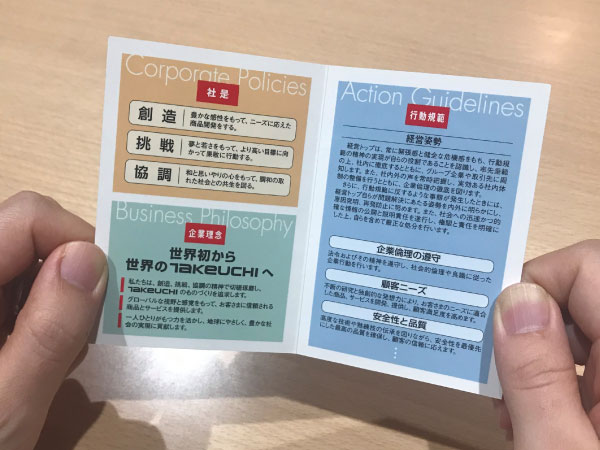
An Our Promises card is distributed in an easy-to-carry size to encourage the spirit of compliance
"Our Promises" card
We distribute Our Promises cards, showing our Corporate Policies, Corporate Philosophy, and Code of Conduct, to all employees. To fulfill our corporate social responsibilities, we then ensure that they thoroughly understand the content and act responsibly and with good conscience.
Compliance Manual
We publish a Compliance Manual and distribute it to all employees, including executives. In April 2022, the manual was revised, updated and redistributed to all employees.
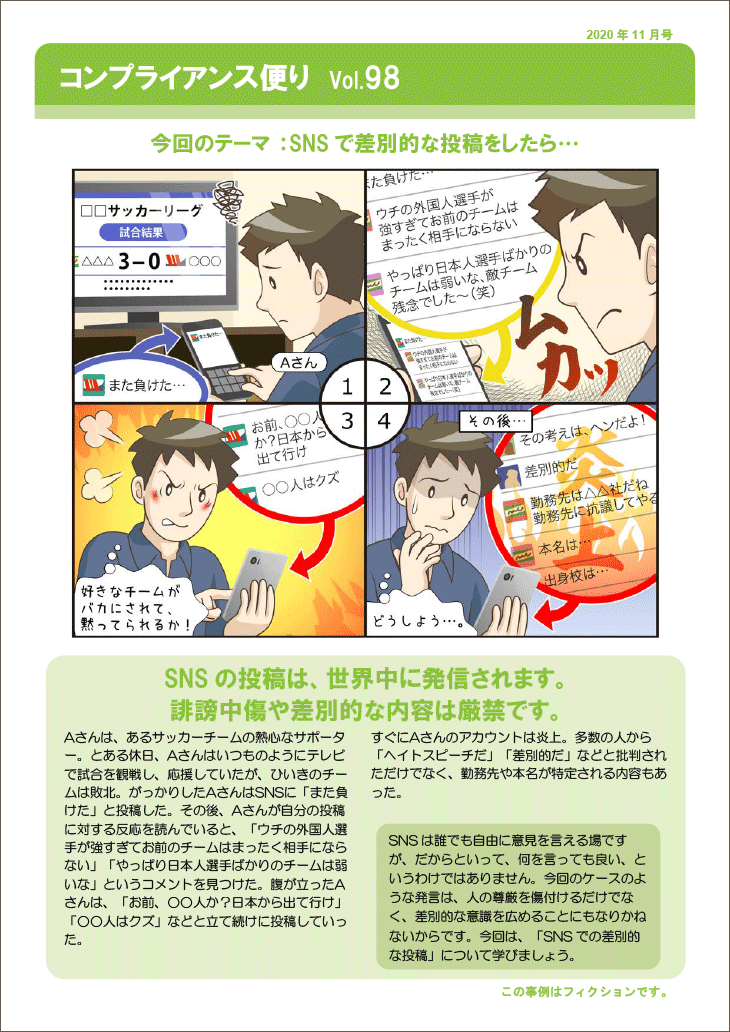
Compliance Newsletter (monthly)
Compliance education and training
We provide education and training to raise employees' awareness of compliance. Specifically, we hold compliance training sessions during new employee training and other internal training sessions, send out a compliance newsletter (12 times a year), test understanding (four times a year), and conduct follow-up training sessions (based on test results). In these ways, we work continually to bolster compliance.
In fiscal 2021, we held antiharassment training sessions for the company's managers, led by an external lecturer.
Record of compliance tests
| Year of implementation | Month | Theme | Number of respondents |
|---|---|---|---|
| 2015 | Feb. | Insider trading | - |
| Jul. | Industrial Safety and Health Act. and the Labor Standards Act | - | |
| Oct. | Mixing of business and personal affairs | - | |
| 2016 | Feb. | Unfair Competition Prevention Act | - |
| Jun. | Abuse of authority (harassment) | - | |
| Aug. | Business entertainment and gifts | - | |
| Nov. | Overwork | 437 | |
| 2017 | Feb. | Compliance basics | 436 |
| May | Terminology | 448 | |
| Aug. | Insider trading | 450 | |
| Nov. | Manners and morals | 462 | |
| 2018 | Feb. | Acting with integrity | 457 |
| May | Dealing with harassment | 447 | |
| Aug. | Dealing with a breach of manners | 438 | |
| Nov. | Emotional control at work | 442 | |
| 2019 | Feb. | Road Traffic Act | 444 |
| May | Business entertainment and gifts | 489 | |
| Aug. | Insider trading terms | 484 | |
| Nov. | SNS | 483 | |
| 2020 | Feb. | General compliance | 466 |
| May | Abuse of authority (harassment) | 520 | |
| Aug. | Communications | 517 | |
| Nov. | COVID-19 pandemic morals | 518 | |
| 2021 | Feb. | Fraud prevention | 586 |
| May | Discrimination-free workplace | 621 | |
| Aug. | Power harassment | 620 | |
| Nov. | Manners and Morals | 623 | |
| 2022 | Feb. | SDGs | 613 |
| May | Insider transaction | 659 | |
| Aug. | SDGs (2) | 674 | |
| Nov. | Worker dispatching and contracting | 677 | |
| 2023 | Feb. | Occupational health and safety, Road Traffic Law | 695 |
| May | Power Harassment | 735 | |
| Aug. | Maternity Harassment/Paternity Harassment | 758 | |
| Nov. | Communication | 770 | |
| 2024 | Feb. | Disaster Prevention | 787 |
| May | - | - | |
| Aug. | Power Harassment | 901 | |
| Nov. | Power Harassment | 864 |
- From February 2015 to November 2020, the test was conducted for regular employees of Takeuchi Manufacturing (non-consolidated), and since February 2021, the test is conducted for regular and contract employees. Temporary employees are not covered.
- A five-question test is given once every three months.
- Based on the results of compliance testing, follow-up training is conducted as needed.
Preventing corruption
- Guided by our Basic Compliance Policy, we prohibit all bribery of public officials in any country.
- Our employment regulations and Compliance Manual prohibit employees from giving or receiving any money or goods to/from business partners, etc.
- In fiscal 2016 and 2019, we tested the understanding of business entertainment and gifts.



